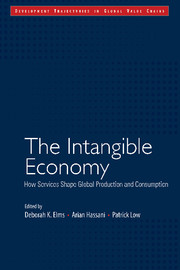Book contents
- Frontmatter
- Contents
- List of Figures, Tables and Boxes
- Acknowledgements
- 1 Introduction
- 2 Contextualizing Services in the World Economy
- 3 Services and Development: Priorities for Reform
- 4 Gainfully Linking into Global Value Chains: A Middle-Income Country's Perspective
- 5 Who Governs Global Value Chains?
- 6 Supply Chain Finance
- 7 Services and Economic Integration in ASEAN
- 8 Indian IT Firms: The Push for Innovation
- 9 Leveraging Business Process Outsourcing for Growth
- 10 Services in Global Value Chains and the Impact of Policy
- Contributors
- Index
- Development Trajectories in Global Value Chains
5 - Who Governs Global Value Chains?
Published online by Cambridge University Press: 19 October 2018
- Frontmatter
- Contents
- List of Figures, Tables and Boxes
- Acknowledgements
- 1 Introduction
- 2 Contextualizing Services in the World Economy
- 3 Services and Development: Priorities for Reform
- 4 Gainfully Linking into Global Value Chains: A Middle-Income Country's Perspective
- 5 Who Governs Global Value Chains?
- 6 Supply Chain Finance
- 7 Services and Economic Integration in ASEAN
- 8 Indian IT Firms: The Push for Innovation
- 9 Leveraging Business Process Outsourcing for Growth
- 10 Services in Global Value Chains and the Impact of Policy
- Contributors
- Index
- Development Trajectories in Global Value Chains
Summary
Introduction
Much has been written on GVCs over the past few years. However, this literature has often gone in different directions, resulting in inconsistent analysis using different terminology. This has tended to muddy the waters. Authors have discussed the key concept of ‘governance’ in different contexts with alternate meanings in relation to the operation of GVCs, which has resulted in confusion for analysts and practitioners of trade policy.
Since the focus of authors has often been different, there has been no consensus around the notion of ‘governance’ of GVCs. Many economists have written about governance of value chains with what, in this chapter, we are going to call ‘g’. Our definition covers industrial and national policy frameworks from the perspective of firms and individual countries.
Note that the term ‘governance’ is also being used to refer more broadly to the WTO, the entire global trading system, and its relationship to this new phenomenon. In this chapter we call the latter ‘G’, as it is more concerned with systemic issues.
The aim of this chapter is to bring some clarity and shed light on the various perspectives that have been used by economists in the GVC literature and to remedy terminological confusion when talking about governance with respect to GVCs. This should remove some of the misunderstandings that have been generated by discussing the same term with underlying reference to different contexts.
A typology of GVC governance
We propose to set out a typology of GVC governance in three different categories:
• industrial policy frameworks and the governance of GVCs from a firm perspective;
• national policy frameworks and governance of GVCs from an individual country perspective; and
• global trading system framework and governance of GVCs from the WTO perspective and/or that of major preferential trade agreements.
For the purpose of this chapter, governance of GVCs from the firm and individual country perspectives will be discussed with a small ‘g’ while governance of GVCs from the perspective of the multilateral trading system or multiparty trade agreements will be discussed with a capital ‘G’. This is because in the first and second cases governance is used in a micro sense, applied to either firm behaviour or national government policy, while in the third case governance is used in a broader, systemic sense as affecting all economic actors in the world economy or in a regional economic grouping.
- Type
- Chapter
- Information
- The Intangible EconomyHow Services Shape Global Production and Consumption, pp. 55 - 80Publisher: Cambridge University PressPrint publication year: 2017
- 1
- Cited by

